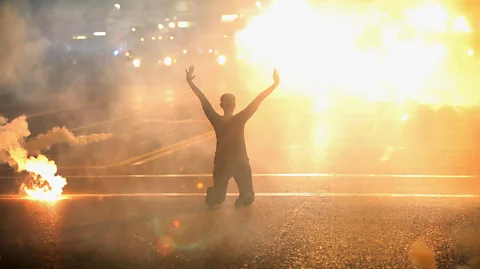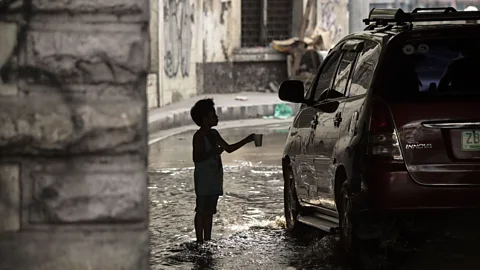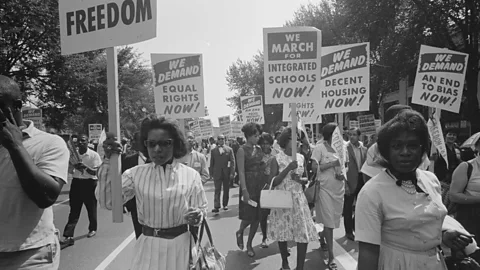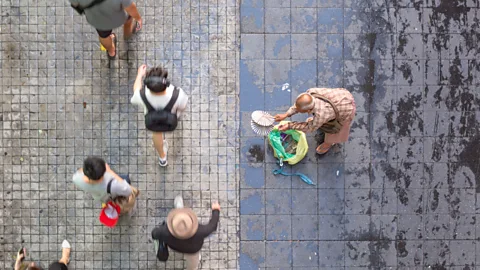Injustice is everywhere, so what are our moral duties?
 Getty Images
Getty ImagesOur world is unjust and replete with suffering – what can an individual possibly do about it? As the philosopher Kieran Setiya writes, there are far better options than capitulation or despair.
Chances are, before you clicked the link that brought you here, you were doomscrolling: skimming from headline to headline in a daze of horror. Click once to see energy prices spiraling; click again for the faltering of democracy; a third time for glaciers melting as climate chaos worsens. Scanning the news can leave you feeling overwhelmed by the scale of the world's crises. What choice do we have but to deaden our emotions? The alternative would be guilt and shame for carrying on our lives without doing much to make a difference.
We are not alone, and we are not the first. Exiled from Germany to the US during World War Two, the philosopher Theodor Adorno mourned: "What would happiness be that was not measured by the immeasurable grief at what is? For the world is deeply ailing." And yet what good does grieving do? It's of no use to anyone, least of all ourselves. "The almost insoluble task," Adorno wrote, "is to let neither the power of others, nor our own powerlessness, stupefy us."
How should we face up to the injustice of the world? That's a question I tackle in my new book Life is Hard: How Philosophy Can Help Us Find Our Way – along with adversities more personal to us: infirmity, loneliness, grief, and failure. There is no cure for the human condition, but after 20 years teaching and studying moral philosophy, I believe that it can help.
COMMENT & ANALYSIS
Kieran Setiya is a professor of philosophy at MIT in Cambridge, Massachusetts, and the author of Life is Hard: How Philosophy Can Help Us Find Our Way (Penguin Random House) – a guide to facing life's inevitable hardships.
Philosophers ponder the nature of reality and of human life, constructing abstract theories, and trading in thought experiments that make the familiar strange. But moral philosophy also has a practical purpose. As Plato wrote in the Republic, circa 375BC, "the argument concerns no ordinary topic but the way we ought to live".
In 19th Century Britain, for example, this aspiration fueled the moral theory known as utilitarianism. According to the "principle of utility", we should always strive to produce the "greatest happiness of the greatest number". It was a radical idea. Traditional institutions could no longer be taken for granted, and were held to a new moral standard: do they contribute to human happiness? If not, they must change. Utilitarians argued for universal suffrage, prison reform, aid to the poor and better treatment of animals – and they made progress towards these goals.
There are downsides to embracing utilitarianism wholeheartedly, however. Utilitarians say that one should give as much weight to the happiness of strangers as one does to one's own happiness or that of loved ones: they advocate almost total self-denial. And they argue that the end always justifies the means: if you can save a thousand lives by murdering a hundred people, then other things equal, you should.
 Getty Images
Getty ImagesA potentially more palatable response to human suffering comes from "Effective Altruism", a philosophical movement that has become highly influential over the past decade. It encourages its followers – including billionaires – to donate a significant portion of their income to important-but-neglected causes, such as tackling disease in the developing world. According to one estimate, Effective Altruists currently raise $420m (£370m) a year.
Effective Altruism often draws on the principle of utility, but brackets its more troubling implications. As Effective Altruists point out, it's right to prioritise your own life and the lives of those you love, and wrong to promote the greatest happiness by violating human rights. But we still end up with a substantive moral view. Altruism may not be the whole of morality, but it's surely part. We can meet our altruistic obligations, while respecting people's rights, by giving away part of what we have. And while there are limits to how much we are required to give – Effective Altruists often urge a tithe of 10% – we should give what we can to the most effective causes, ones that have the biggest positive impact on aggregate happiness.
The attractions of this approach are evident: it is simple, pragmatic, and apparently backed by data. Effective Altruists devote considerable acumen to rating the effectiveness of different charities by measures such as "quality-adjusted life years" saved. For example, mosquito nets and malaria medicines save more lives per dollar than other charitable interventions. Effective Altruism offers a concrete vision of what to do instead of doomscrolling. Who would deny that wealthier citizens should give away more of what they are privileged to have? And who would plead for inefficient, wasteful giving?
These questions put the critic of Effective Altruism in an awkward spot. And yet the truth is that the movement doesn't really answer the question we began with: how should we respond to the injustice of the world? As its name suggests, the focus of Effective Altruism is on philanthropy, not justice. It's a theory of how to spend one's money and time as an individual, not how society should be organised or transformed.
 Getty Images
Getty ImagesThe Effective Altruist's problem with justice shows up everywhere. For instance, when we measure the effectiveness of charities in terms of "quality-adjusted life years", we discount years of life impaired by disability, giving them less weight in our calculations. To do that in public policy or charitable giving is to treat the lives of disabled people as less worth saving than the lives of the able-bodied.
Another issue is Effective Altruism's attitude to politics. The objection isn't just that political interventions, rather than charitable ones, might be a more effective means to greater aggregate happiness. It's about the division of moral labour. Imagine we carved the world into nation-states in order to discharge our altruistic obligations more efficiently, each state responsible for its own citizens. In that case, it would be double-counting to make citizens of one country take up the slack when another government fails. That doesn't mean we should do nothing, but our individual obligations would be limited, and might have more to do with political reform than direct intervention. Of course, the real world doesn't match this just-so story; the history of nation-states and their altruistic roles is more complex. But there's no way to assess the scale of our actual obligations, or how we should respond to them, without asking how the cartoon differs from reality – addressing questions of global politics Effective Altruists neglect.
Finally, the problem of justice shows up in how much of the harm we see in the world is collectively caused. When a Westerner looks at drought or famine in post-colonial countries, they can't ignore the history of colonial exploitation. And when they look at climate change, they can't ignore its human causes, or the fact that its harms will disproportionately burden those who are least responsible for it. Addressing such harms is not a matter of altruism – like helping the victims of a natural disaster far away – but a question of injustice and one's complicity in it. By treating this as charity, Effective Altruists let the wealthy world off the moral hook.
Responsibility for justice
Is there a better framework for thinking through our moral obligations – and a better alternative to doomscrolling? I think we find one in the work of Iris Marion Young, a pioneering political theorist who died of cancer at the age of 57. Young developed the concept of "structural injustice" – injustice that is not localised in unjust attitudes or actions, but emerges interactively – and proposed a new model of responsibility to go with it. Effective Altruists treat all human needs alike, but we are more responsible for some than others. In short, our moral relation to human suffering is more urgent when we're caught up in its causes or effects.
Young contends that we're responsible for structural injustice. At the root of her argument is a contrast between, on one side, culpability or blame, and on the other, responsibility for change. To take an example: while it's unfair to criticise present-day Americans for their nation's racist history, they are often implicated in systems that sustain its legacy now. Consider education. American cities are de facto segregated and since schools are supported by local taxes and Black communities are disproportionately poor, their schools are on average less well-funded than schools in wealthy neighbourhoods. Equality of educational opportunity is a myth. While the structures are not my fault, I was caught up in them when I bought a home in the affluent town of Brookline, Massachusetts, partly for the good public schools. "The social connection model of responsibility says that individuals bear responsibility for structural injustice," Young writes, "because they contribute by their actions to the processes that produce unjust outcomes." She is looking at me.
 Getty Images
Getty ImagesYoung's point is not about guilt or shame, but the obligation to act. This is what she means by "responsibility". I may not be wrong to want a good education for my child or to blame for the way schools are funded, but I should advocate reforms that redress the injustice to which I contribute. We can extend Young's model not just to those who participate in social practices that perpetuate injustice but to those who benefit from an unjust past, as many of us benefit from the legacy of slavery and colonial oppression.
You may also like:
In the face of such complicity, what are we to do? Young holds that our responsibility "is not primarily backward-looking". It's a matter not of blame but of agency: "Taking responsibility for structural injustice … involves joining with others to organise collective action to reform the structures." The obligation is daunting, Young admits: "If I share responsibility … for every social injustice that results from structural processes to which I contribute by my actions," she writes, "then this makes me responsible in relation to a great deal. That is a paralysing thought." But the proper response to paralysis is not inaction; it is to take the first step. Do one thing.
Let me admit – or rather, insist – that I am not a model to emulate here. I have not done much: occasional marches and political campaigns, voting regularly, talking politics with friends. All good, but none of it likely to make much difference. Young confronts bystanders like me with "the question of the agent of change". It's not enough to identify injustice, nor to vote for politicians you prefer, who will often be indifferent or obstructive to the change you want to see; and it is typically futile to act alone. Our task is to find collective agents – movements, unions, interest groups – that have the power and will to make things happen.
I am not much of an activist, let alone a leader, and I feel routinely crushed by the injustice of the world. If that resonates with you, my advice is to pick a single issue – mass incarceration, poverty, voting, women's rights – and find a local group that you can join. For me, the issue was climate change and the group was Fossil Free MIT, whose 2014 campaign led to MIT's first Climate Action Plan. Since then, I've given talks about climate justice and addressed the issue online. Four years ago, I developed a class on the ethics of climate change with a colleague at MIT.
I am sure it's not enough, and I feel some guilt about the fact that I'm not doing more. You may share that guilty feeling, directed at the issues that disturb you most. Are we doing all we can to fight injustice? Who can say they do enough? Writing in the wake of World War Two, Adorno warned: "Wrong life cannot be lived rightly." He meant that we cannot live well in conditions of injustice that sully every aspect of social life; we cannot even know what flourishing would be. But there is a more mundane truth in his aphorism.
 Getty Images
Getty ImagesWe know that there are limits to what we can ask of ourselves in "living rightly", given who we are. What we are capable of doing turns on our psychology and social circumstance, our partial grasp of the social world, the need to maintain our equilibrium. But though we know that we have limits, we don't know where those limits are. The result is that, when I ask myself whether I am doing enough to meet my responsibility for justice, it would be an awfully neat coincidence if the answer were yes. What are the odds that I've hit the mark precisely, the most I can expect of myself? Close to zero, I would think. The result is that I am virtually certain that I am falling short. Perhaps it's obvious that I am. But the same reasoning applies to almost anyone, even those who do much more, people whose lives are devoted to social change. Even lifelong activists can't be sure they've done enough. In conditions of widespread injustice, we are compelled to doubt that we are living well.
There's instruction and reassurance to be found in this. We shouldn't feel too bad that we feel bad: our guilt is not a mistake. More importantly, we shouldn't let it put us off, condemning our own efforts as too small. They may be small – but it's perverse to deal with that by throwing up our hands and doing less. There is value in a single step towards justice, and one step leads to another. While it's hard to make a difference on one's own, the march of millions is made up of individuals. Collective action exists at every scale, from local unions to protests and political campaigns.
Confronted with the scope of human misery, some despair: "It doesn't matter what I do," they say, "since millions will still suffer." But this thought is confused. We may not do enough, but the difference we make when we save a life is the same whether we save one of two, or one of two million. A protest may not change the world, but it adds its fraction to the odds of change. It's wrong to disregard the increments.
* Kieran Setiya is a professor of philosophy at MIT in Cambridge, Massachusetts.
--
